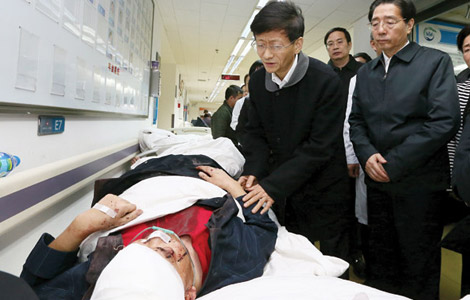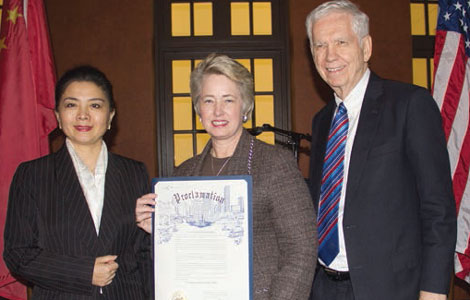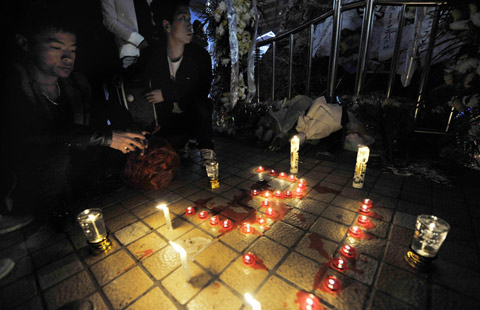UN envoy condemns terrorism
Updated: 2014-03-03 23:25
By Guo Anfei in Kunming Cui Jia, Hu Yongqi and He Na in Beijing (China Daily USA)
|
||||||||
Li Wei, director of the Anti-terrorism Research Center at the China Institutes of Contemporary International Relations, said that although the attack may have appeared to be a random incident, it was consistent with the tactics employed by terrorists, who constantly look for ways to penetrate poorly protected regions. He noted that the attack came just days before more than 5,000 national legislators and political advisers meet in Beijing for their annual sessions.
In Urumqi, Xinjiang's regional capital, and Beijing, authorities have long been aware of the need for precautionary measures, but Kunming is relatively weak in this regard, he said, adding that the use of identical clothing and weapons suggested that the attackers had spent a long time training and preparing for the attack.
He said the fight against terrorism should be guided by an overarching plan that implements concerted measures nationwide.
"This time it was Kunming, but it's impossible to say where it the next attack will occur. We can't rule anywhere out," he said.
For some of the survivors, the injuries were both physical and mental.
On Sunday morning, Wang Xianlong, 61, lay in bed at Kunming No 1 People's Hospital after spending five hours in surgery while doctors stitched up a 20-cm-long stab wound in his abdomen.
When the attack started, Wang Xianglong, a migrant worker from Baoshan city in Yunnan, and other passengers were waiting to board a train to Hebei province in North China. Wang Dezhu, one of Wang Xianlong's colleagues, said several migrant workers used bamboo hookah pipes to fend off the attackers.
Wang Xianlong wasn't aware he had sustained a deep cut to his abdomen, according to Wang Dezhu, who cared for many of the injured.
"I clearly saw his intestines coming out. He caught them and held them in place until the ambulance came to our aid," said Wang Dezhu. "Our colleagues are mostly in their 50s or 60s and they can't stand up to attacks like this. It's not safe out there anymore and we won't go to Hebei or any other province just to make money."
Wang Yangsheng from Guangzhou in Guangdong province, who was on a business trip, was buying a ticket at the station when the attack started. "I was facing the machine. Who could imagine that someone would slash me from behind?" said the 31-year-old, who sustained minor injuries.
He said the hospital was full of the injured by the time he arrived and the medical staff was racing to treat the victims. "I didn't have to pay for the treatment, and the authorities even provided free food," he said.
Although his wife is planning to fly to Kunming to look after him, Wang Yangsheng said he won't feel safe until he is at home. "I hope I can recover quickly and leave this place as soon as possible."
Yunnan University student Wu Jiangli was being treated for head injuries. "Whenever I close my eyes, the bloody scene comes into my mind again. My head is full of people's screams and blood. My physical injuries aren't serious, but a lot of mental harm has been done," she said.
Ma Juan, a student at Dali Medical College who was slashed across the head, said she was heading back to school in Dali, about 350 kilometers from Kunming, when the attackers appeared. "My head was slashed by a knife just as I began to run. Everything happened so quickly that I didn't even see the person who injured me. Fearing I might be struck again, I ran out to the road to call for help. I was in severe pain," she said.
With the help of passersby, Ma was taken to hospital. When she learned that 29 people had died and more than 120 had been injured, she said nothing, she just cried.
Saturday's attack was the most serious incident in China since 2009, when 197 people died in a riot in Urumqi.
In June last year, 24 people were killed and 23 injured in an attack in Lukqun Township, Turpan prefecture in Xinjiang. Local police said the suspected leader of the gang arranged for members to watch videos promoting religious extremism, and in the days before the attack, terrorists from Kuqa county in the south of the region called on the gang to carry out a jihad, or holy war.
On April 23, 15 people were killed in an attack in Selibuya township in south Xinjiang's Kashgar prefecture. Police said members of a terrorist cell regularly attended meetings where they studied material relating to religious extremism and terrorism. They also underwent physical training and learned to kill by watching footage of terrorist attacks.
The spread of religious extremism has led to an increase in the number of attacks, said Ma Pinyan, a senior anti-terrorism researcher and deputy director of the Ethnic and Religious Studies Center at Xinjiang Academy of Social Sciences.
In January, Nur Bekri, chairman of the Xinjiang government, said preventing and eliminating religious extremism has become an important task for the region as it strives to maintain long-term stability.
Yang Shu, director of the Institute of Central Asia Studies at Lanzhou University in Gansu province, said Xinjiang-inspired terrorist activities outside the region began much earlier than is generally acknowledged. He said police in the provinces of Gansu and Hebei had foiled several planned attacks in recent years.
On Oct 28, a jeep was driven into a crowd at Tian'anmen Square in Beijing, causing five deaths and 40 injuries. Police found gasoline, knives and steel bars in the car, along with a flag decked with extreme religious slogans.
The police later said the crash was the work of the East Turkestan Islamic Movement, which the Chinese government describes as a terrorist organization.
Mei Jianming, a professor at People's Public Security University of China, said it's difficult to identify terrorists because they can easily lay down their weapons and blend in with ordinary citizens. Ease of transport also means that they can quickly flee to regions where they are unknown.
According to Yang, the mismanagement of domestic ethnic relations and a misunderstanding of religion have resulted in an increase in domestic terrorism.
Yang said China is currently witnessing a wide range of social transformations and the terrorists use social problems as a way of recruiting new members. The establishment of an innovative social management mechanism to resolve social conflict would be the most effective anti-terrorism measure, he said.
Li of the China Institutes of Contemporary International Relations said the government should make the establishment of a counter-terrorism early warning and prevention system a top priority. "No matter how effectively we handle the aftermath of attacks, ordinary people are the victims. We need to set up an effective anti-terrorism intelligence mechanism to prevent such atrocities from happening in the first place."
He also urged the upgrading of China's anti-terrorism legislation to allow the government to mobilize more resources to prevent attacks.
Bo Xiao, director of the legislative affairs commission of the Xinjiang Regional People's Congress Standing Committee, said the Xinjiang government is considering anti-terrorism legislation. So far, the NPC, the country's top legislative body, has not added a nationwide anti-terrorism law to its work plan.
In 1997, Chinese criminal law was amended to include organizing, leading or joining terrorist cells after "organized terrorist crimes began to surface in some parts of China", according to Liu Renwen, a researcher in criminal law at the Chinese Academy of Social Sciences. People convicted of these offenses face sentences of 10 years to life imprisonment.
On Oct 29, 2011, the NPC's Standing Committee passed the Decision on Issues Related to Strengthening Anti-Terrorism Work, which clarified the definitions of terrorist activities, organizations and terrorists. It also included a list of suspected terrorist organizations and their members.
Liu said, "China has been considering drafting a comprehensive anti-terrorism law since the September 11 attacks in the United States in 2001, but it was difficult to reach a consensus on certain issues. The ‘decision' was the result of that."
Xue Dan, Li Yingqing and Yang Wanli in Kunming, Dong Fangyu, Yang Yang, Zhang Lei and Zhang Yan in Beijing, Gao Bo in Urumqi, Zhang Yuwei, Amy He and Zhang Yang in New York and Xinhua contributed to this story.

 Oscars 2014: Most catchy moments
Oscars 2014: Most catchy moments
 China joins in NY Times' travel show
China joins in NY Times' travel show
 UN envoy condemns terrorism
UN envoy condemns terrorism
 Rio drops protests for Carnival
Rio drops protests for Carnival
 Houston-China bonds deepen with new group
Houston-China bonds deepen with new group
 Citizens mourn victims of Kunming terror attack
Citizens mourn victims of Kunming terror attack
 Putin justifies potential military move in Ukraine
Putin justifies potential military move in Ukraine
 Photos: Kunming rail station violence
Photos: Kunming rail station violence
Most Viewed
Editor's Picks

|

|

|

|

|

|
Today's Top News
US halts military engagements with Russia
First Lady to visit China in March
Terrorists in Kunming attack busted
Gravity, Slave Oscar winners
2014 the year of the Chinese IPO?
China making progress on fighting pollution: experts
Michigan benefits from ties with Chinese
Detroit toasts all time high in China trade
US Weekly

|

|






